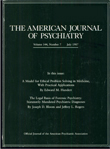TO THE EDITOR: In his letter, Dr. Gold puts forward five points from which he concludes that the “appearance of stability” in IQ in our subjects is actually “likely evidence of intellectual decline.” We discussed three of Dr. Gold's points in our original paper; the remaining two are matters of test artifact.
1. Dr. Gold raises the issue of the short form of the WAIS-R and refers to data he has collected on 103 adults with schizophrenia by using the WAIS-R. His results revealed a lower mean subtest score when 10 subtests, rather than just five, were administered; however, equivalent IQs were derived from both. The difference between the means of the 10- and the five-subtest scores is statistically significant, but it would never be considered practically significant. The IQ literature suggests that a scaled score should be at least 3 points above or below the mean before it can be considered noteworthy (
1). Dr. Gold presents scores that are approximately one-third of a scaled score from the mean.
In the original article, we presented considerable data about the reliability and validity of the five-subtest short form of the WAIS-R. An advantage of the short form is that it omits several of the subtests (e.g., information and arithmetic) that assess educational attainment. Furthermore, we chose the tests to control for the disabling effect that a long period of serious mental illness may have had on this group's ability—for example, their ability to name accurately five prime ministers of Great Britain since World War II. We also considered issues of test fatigue in patients who, in general, remain chronically unwell (
2).
2. Gold points out that we included six to seven subjects with IQs lower than 75 and raises the issue of comparing WISC and WAIS scores among subjects termed “intellectually limited.” The cutoff for “intellectually limited” is usually a full-scale IQ lower than 70. We have, therefore, reexamined our data in subjects whose full-scale IQs were lower than 70. During the follow-up period, 50% of these subjects showed improved IQ, and 50% showed a decline. There were no significant differences between IQs at time 1 and time 2 in the subjects whose full-scale IQs were lower than 70, a finding similar to the findings for the group overall. Thus, there is no substance to Dr. Gold's argument.
We do agree with Dr. Gold that one must be cautious in interpreting longitudinal data. However, our study did control for the age cohort effects of cross-sectional studies and the questionable validity of IQ estimative methodology upon which the “myth” has been built.

